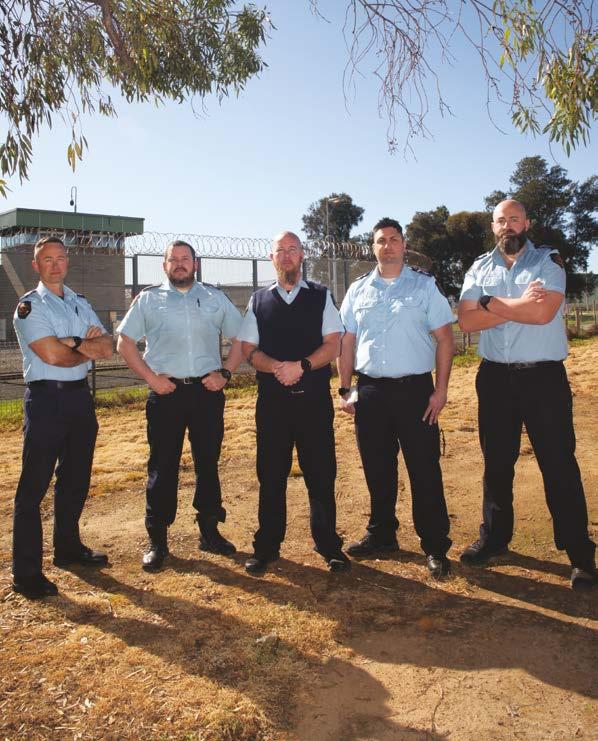
Review Public Sector Public Sector Review Magazine • AUGUST 2023 Anti-protest laws passed 8 Anna Stewart Memorial Project 15 Bridging the gender pay gap 14 PSA backs ‘Yes’ campaign for Voice 12 SOLIDARITY • EQUALITY • INTEGRITY • RESPECT • FAIRNESS • COMMUNITY
WORKSITE SAFETY: STATEWIDE PRISON LOCKDOWN SENDS MESSAGE TO GOVERNMENT
Welcome to the latest Public Sector Review.
The PSA and our Correctional Officer members have had a busy time in recent months dealing with issues in the state’s prisons. In this edition, we re-cap on the statewide lockdown, the PSA’s efforts to develop a model for safer prisons, and also the alarming safety and security issues at Port Augusta Prison.
We look at how all Australians have the opportunity to make history by voting ‘Yes’ in the national referendum on recognising Aboriginal and Torres Strait Islander peoples as the first inhabitants of this land, and creating a Voice to Parliament. We outline the reasons for the PSA deciding to support the “Yes” vote and try to explain what the Voice is and what it is not.
There are articles on the fight against anti-protest laws, our new Allied Health Professionals Network, information about your right to be consulted on changes in your workplace and a discussion on bridging the gender pay gap.
We have also just launched our new Member Benefits program through Union Shopper to help you save on everyday purchases. Finally, we’d like to share with you a video from the Hon. Tom Koutsantonis, Minister for Infrastructure and Transport and Minister for Energy and Mining, in which he acknowledges the importance of unions and the importance of being a union member if you are part of the workforce. Scan the QR code with your smart device to watch the video.
Public Sector Review Magazine | AUGUST 2023 2 CONTENTS MEMBER BENEFITS NEWS MEMBER INFO From the General Secretary 3 Time is ripe to re-energise the public sector From the President 4 Playing your role in defending public services From the Assistant General 5 Secretary We are many, we deserve respect and together we can change Statewide prison lockdown 6 sends message to government Prison security breach opens 7 window on world of worksite safety Bi-partisan support sees 8 anti-protest laws toughened AHPs are organising for a better deal 9 PSA takes child protection 10 concerns to Canberra Union wins: Reclassification 10 success at DCP and WCHN Consultation: An industrial 11 right enshrined in your agreement PSA backs ‘Yes’ campaign for Voice 12 Bridging the gender pay gap 14 Doin’ it for themselves 15 The Anna Stewart Memorial Project Out and About with PSA Members 16 Union Aid Abroad – APHEDA 18 Global justice education for unionists Super SA: Financial independence 19 to financial wellness Health Partners Recipe 20 Salmon and sweet potato fishcakes with green beans Johnston Withers Lawyers 21 Navigating the legal landscape of relationship breakdown PSA Holiday Home: Port Vincent 22 PSA joins Union Shopper 23 The website has general interest articles, a links page and specific sections for women, schools, higher education and correctional services. www.cpsu-spsf.asn.au FEDERAL WEBSITE The Public Sector Review is an official publication of the Public Service Association of SA Inc and the Community and Public Sector Union (SPSF Group) SA Branch. Comments, letters and editorial material to: ‘The Editor’, Public Sector Review Level 5, 122 Pirie Street, Adelaide SA 5000 Tel: 08 8205 3200 Fax: 08 8223 6509 Toll-Free: 1800 811 457 Email: enquiries@psaofsa.asn.au Review
Sector Designed and printed on recycled and sustainably sourced paper by Created 2 Print, 107 Sturt Street, Adelaide SA. www.created2print.com The Public Sector Review’s official publication number is PP565001/0010. Volume 7, Number 2. Responsibility for political content in this publication is taken by Natasha Brown.
Public
WELCOME
psaofsa.asn.au @PublicServiceAssociationSA @psa_of_sa
Natasha Brown
Christian Hagivassilis
The revelation this year of unethical practices by global consulting firm PwC brings into sharp focus the ongoing debate about the questionable role “for profit” advice plays in the delivery of good government.

For decades now, consulting firms, and other private sector organisations, have been the go-tos for everything from so-called “independent” reviews to outsourcing of entire services. With all of this, there has been the very real risk of unethical behaviour, maladministration and incompetence – the latter an embarrassing hallmark of privatised prisons in Australia.
For too long, the public sector has become a virtual procurement officer for private sector services instead of seeking to develop those within its ranks and providing informed and fearless advice.
It’s time to start strengthening our public sector workforce and placing trust and investment dollars in our public servants to enable them to do the high-level strategic thinking needed to guide policy in our state and nation.
According to a recent audit, the Morrison Government spent nearly $21 billion on outsourcing public services in its final year alone. A Senate inquiry is now underway into the management and assurance of integrity by consulting services provided for the Australian Government. At the time of writing, the PwC scandal appears to be just the tip of the iceberg, with former senior officials and independent experts telling the Senate inquiry that conflicts of interest are “rife” with the
TIME IS RIPE TO RE - ENERGISE THE PUBLIC SECTOR
use of consultants, and that the Federal Government’s increasing reliance on consultants has effectively created a “shadow public service” with little or no accountability to the Australian people.
The PSA will always support public sector workers being the primary deliverers of public services and is calling on our State Government to lead the philosophical shift back to a public sector that has the capacity to provide services and not just outsource them.
It was disappointing that the Government did not release more detail about its plan to review privatised services in South Australia in its second State Budget released in June.
Prior to the 19 March 2022 election, SA Labor was unequivocal in its pledge to ban further privatisations and review all existing privatised arrangements.
However, since making those statements, progress on this key election priority has been very slow.
In his first budget speech as Treasurer in 2022, Stephen Mullighan stated: “... the Malinauskas Labor Government values our public sector workers. Over the past two years in particular, they have done an outstanding job protecting our state and maintaining vital public services. We will not be simply cutting public service numbers in pursuing savings.”
These are admirable sentiments, but so far the reality hasn’t quite matched the rhetoric.
This year’s state budget included some welcome spending in the areas of Health, Housing and Child Protection. Additional funding for early intervention programs for vulnerable families is something that the PSA has been advocating for many years. However, we remain concerned that not enough detail has been forthcoming about
by Natasha Brown
how some of these essential programs will be staffed and resourced; and importantly whether these new staff will be directly employed through the public sector.
Despite a change of government, the dreaded efficiency dividend requirement has been retained again in this year’s State Budget. The PSA has long held that efficiency dividends are a blunt instrument, which strip the heart out of agencies and leave staff to tackle unreasonable workloads leading to burn-out, poor workplace culture and ultimately a reduction in quality services being delivered to the public.
It is the PSA’s position that if the Government were to cease engaging consultants and contractors and instead put its trust in the skills of the public service, agencies could realise significant savings.
In my last column for the Review I touched on the concept of a “wellbeing budget”, something Federal Treasurer Jim Chalmers spoke of in relation to his first budget in 2022. The PSA has also been advocating for the State Government to establish a wellbeing budget framework for South Australia.
An ever-growing number of people are recognising that measuring our progress as a society can no longer be limited to economic growth.
A functioning, healthy society will be deemed as such based on a number of disparate indicators that make human wellbeing a priority.
Translating this philosophy to the budgetary sphere means acknowledging that areas including education, healthcare, mental health support, environmental sustainability, and social cohesion are fundamental contributors to a thriving society and require commensurate public spending.
Far from being an impediment to growth, early investment across social and environmental projects can also lead to economic growth as healthier, more educated individuals are equipped to make a greater contribution to society and a prosperous future.
www.psaofsa.asn.au 3 A message from the General Secretary
If you haven’t already done so, I encourage you to scan the QR code in the introduction to this edition of the Review to watch the video message from the Hon. Tom Koutsantonis, Minister for Infrastructure and Transport and Minister for Energy and Mining.
In it, he argues that by joining a union individuals can stand in solidarity with their co-workers, ensure the security of their jobs and have a collective voice. He is not the only politician to acknowledge the role that unions play in protecting and advancing workers’ rights – in giving them a say. In a recent episode of the ABC’s Q+A program, Federal Minister for the National Disability Insurance Scheme and Minister for Government Services Bill Shorten responded to an audience question about unsustainable workloads with a similar piece of advice – “Join a union.” And US President Joe Biden, on the campaign trail for the 2024 Presidential race, was quick to assure an audience of union members that if “investment bankers in this country went on strike tomorrow, no one would much notice … but if this room didn’t show up for work tomorrow ... the whole country would come to a grinding halt.” The message being that working people – people like those who make up the PSA membership – do jobs that matter; that make a difference.
The role of a public sector union is twofold – to champion the rights of public sector workers through protecting and
A message from the President
PLAYING YOUR ROLE IN DEFENDING PUBLIC SERVICES
 by Lillia Rozaklis
by Lillia Rozaklis
advancing pay and conditions, while also advocating for and protecting the vital role the public sector has in delivering services to the community.
By being a member of the PSA, each of us contributes to those aims. We protect our rights at work, those of our colleagues, and also the rights of the community to receive the services they need and deserve. In this latter role, the PSA is an impassioned stakeholder and it is in the interests of all public sector workers to join with us to make our public sector the best it can be.
comprehensive benefits packages, unions can help attract and retain skilled professionals in crucial public service roles.
Public sector unions also advocate for adequate staffing levels and safe working environments. By addressing issues such as understaffing, excessive workloads, and workplace safety concerns, unions help ensure that public service employees can effectively carry out their duties.
PSA members have been instrumental in defending and protecting public services against budget cuts and privatisation efforts. We have conducted public awareness campaigns to garner community support for public services and to highlight their importance in the lives of citizens.
The PSA keeps a watching brief on everything the public sector does – where it is achieving great things and where its performance is falling below public expectations. The PSA is able to do this through our network of Worksite Representative and members on the ground who form the heart of our union.
One of the primary functions of public sector unions is to negotiate fair wages, benefits, and working conditions. By advocating for competitive salaries and
We regularly have a voice at the table with Government Ministers, Opposition and cross-bench spokespeople and senior agency executives to raise issues, question, and influence decisions regarding the needs and concerns of members –ultimately with the aim of ensuring the provision of equitable and accessible community services.
The PSA doesn’t always see eye to eye with politicians, but when they acknowledge the important role unions play, we are definitely on the same page.
Public Sector Review Magazine | AUGUST 2023 4
“ Working people –people like those who make up the PSA membership – do jobs that matter; that make a difference. ”
The work you do benefits, enriches and protects our society and you deserve to be respected for it.
It is work that can only be done in a dignified and effective way through the involvement of the PSA – and through the involvement of PSA members like you.
Throughout our history, PSA members have pushed back against cuts, agitated for positive change and demanded fair treatment at work. We still push because there is still need – there will always be need. Because our working conditions will never be a simple gift; they must be fought for, defended and held on to – by PSA members.
After years of cuts and erosion of services caused by successive governments lacking courage and vision, many areas of the public sector are at crisis point. This has brought with it the absurdity of politicians and agency Chief Executives complaining that they can’t attract or retain staff, while refusing to commit to the dedicated people who are already in their workforce.
When I have asked members what made them decide to take a stand on an issue, the response I usually hear is: “It won’t get better unless we do something.”
In a time where corporate greed and wealth concentration — which has been enthusiastically enabled by governments
A message from the Assistant General Secretary

WE ARE MANY, WE DESERVE RESPECT AND TOGETHER WE CAN CHANGE THINGS
by Christian Hagivassilis
— is impacting on our standard of living, the only way to achieve fairness and dignity at work is by working together.
Right now, PSA members are coming together to seek group reclassifications so they can be paid fairly for the important work they do. Members are pushing for staffing increases to make up for years of cuts, to ensure reasonable workloads and enable truly effective public services. PSA members on shortterm contracts are uniting to be made ongoing.
that “something” can be quieter. It could be keeping your PSA Noticeboard at work up to date. It could be that respectful, yet persistent, conversation with colleagues about why being a PSA member is important. It could be collectively displaying PSA signs at your desks to signal that “We are here and we are union”. It could be through sharing your concerns and providing feedback to the PSA office as part of our consultation processes with members on workplace issues. It could be through involvement in your local consultative committee. All these actions demonstrate a shared understanding between members that we are many, we deserve respect and together we can change things.
Across our membership, we are seeing this quiet activism achieve results, including hundreds of members being reclassified; rolling temporary contracts being converted to ongoing employment and even modest increases to staffing in some areas providing a step in the right direction to solving workload issues.
Members who are sick and tired of being taken advantage of for their dedication to public service are uniting to push for change.
Sometimes doing something needs to be overt, public and loud. Demonstrations of solidarity like protest marches, rallies and industrial action will always be important in defending and improving your rights at work. Other times though,
For almost 140 years PSA members have stood together and built power to achieve great things. And we will continue to achieve great things, both loudly and quietly, as long as we are all standing side-by-side.
www.psaofsa.asn.au 5
“ In a time where corporate greed and wealth concentration — which has been enthusiastically enabled by governments — is impacting on our standard of living, the only way to achieve fairness and dignity at work is by working together. ”
STATEWIDE PRISON LOCKDOWN SENDS MESSAGE
TO GOVERNMENT
“ Our members do not lock down prisons lightly. The action in April showed how serious our members’ concerns are, and reflected the sheer frustration they felt.”
On 11 April, all South Australian prisons were locked down in response to government inaction over safe staffing.
PSA Correctional Officer members took the action after repeatedly having their concerns ignored by Department for Correctional Services (DCS) executive and the Minister for Correctional Services.
“Our members do not lock down prisons lightly. This action showed how serious our members’ concerns are, and reflected the sheer frustration they felt,” PSA General Secretary Natasha Brown said.
“Since the State Labor government came to power last year, the PSA has been calling on it to take decisive action on prison staffing and to fix the consequences of the harsh job-cutting agenda implemented by the previous Liberal government.
“However, what we have seen so far indicates that the current government intends to maintain the previous government’s failed experiment and ignore the crisis in our prisons.”
In 2018, the Liberal government embarked on its so-called ‘Better Prisons’ policy to restructure the way prisons operated in South Australia. This job-cutting policy included the failed privatisation of the Adelaide Remand Centre.
In applying the policy, DCS undertook a desktop assessment of roles required to operate our public prisons.
The entire process was ill-informed and destined to fail on delivering real world improvements in prison operations from its inception.
Ultimately, this was a job-cutting exercise that has seen a reduction in the efficiency and safety of operations in all South Australian prisons. It has also had a devastatingly negative impact on the workforce in terms of morale and workplace culture.
The PSA believes that with a modest reinstatement of some critical roles at each institution, South Australia’s prison system would operate more effectively, efficiently, and, most importantly, far more safely for Correctional Officers and the prisoners for whom they are responsible.

PSA representatives have consistently been putting the issues of concern to DCS over the past two years and communicated these matters to the current Minister from the day he was sworn in.
The PSA prepared a detailed “Safer Prisons” proposal, covering staffing needs across all South Australian prisons, and submitted it to the Minister for Correctional Services in December 2022 and again in March 2023.
The proposal was also tabled and discussed at meetings with DCS in February and March 2023.
“This realistic, practical and achievable plan for better and safer prisons in South
Australia is based on the vast and expert experience of our members who work in prisons every day,” Natasha Brown said.
“When our state’s prisons are operating safely and efficiently, offenders are able to access appropriate rehabilitation opportunities, which are critical to reducing recidivism.”
THE IMPACTS OF UNDERSTAFFING
• Unreasonable workloads and increased overtime
• Prisoner out-of-cell time regularly reduced
• Cancellation of prisoner education and work programs
• Prisoner drug testing backlogged or abandoned
• Untrained prison managers undertaking custodial work
• External contractors ( e.g. tradespeople) turned away due to staff escorts not being available
• Prisons regularly operating on “run short” policies
• Reduced opportunities for prisoners to engage in rehabilitation programs
• Commercial contracts not being fulfilled due to prisoner labour not being available.
Public Sector Review Magazine | AUGUST 2023 6
PRISON SECURITY BREACH OPENS WINDOW ON WORLD OF WORKSITE SAFETY
An embarrassing and potentially dangerous security breach at Port Augusta Prison earlier this year left PSA members genuinely fearing for their safety, resulting in a dispute with the Department for Correctional Services (DCS).
The prison was placed into lockdown for several days in May, with prison staff suggesting the Department had not adequately responded to the issue.
Prisoners had been removing windows from the high-security Saltbush accommodation block to escape and retrieve contraband items such as mobile phones, drugs and weapons from prison grounds at night.

PSA members ceased unsafe work under the Work Health and Safety Act 2012, demanding that prison management make their worksite safe.
Prior to our members ceasing work under the Work Health and Safety Act, DCS pledged to fully investigate and resolve the issue.
The Department was unable to provide Correctional Officers with adequate detail
and commitment to the implementation of remedial works to make the Saltbush unit at the prison safe and secure.
Correctional Officers rightly refused to unlock the prison while their safety remained at risk. The Department lodged a dispute in the South Australian Employment Tribunal (SAET) over our members’ decision to cease unsafe work at the Port Augusta Prison.
The Tribunal Commissioner made a series of consent orders, including that the Department would undertake a program of works to ensure the accommodation units were safe and secure for our members to resume work.
The Tribunal orders specified that the works be done within a specific timeframe.
The initial lockdown was lifted on 25 May 2023, however on the night of 30 May 2023, some Correctional Services Officers assigned to the Saltbush block again ceased unsafe work on health and safety grounds, prompting the Department to lodge a dispute with the SAET on 31 May. After several hours in the SAET, the matter was adjourned while the Department considered its options.
PSA General Secretary Natasha Brown said the incident and the Department’s initial cursory response highlighted many of the ongoing issues with prison management in South Australia.
“Our members had raised concerns about these serious security breaches, and the safety risks they presented, to the Department previously, but the response had been superficial, verging on dismissive,” she said.
“Safety is the absolute number one priority for our members. When they raise these types of issues with the department they don’t expect to be fobbed off.
“All workers in South Australia have a right to cease work if they believe the work they are being asked to do poses a risk to their health and safety.”
PSA members will continue to monitor the steps the Department is taking to make the Saltbush Unit secure. Their safety depends on it.
www.psaofsa.asn.au 7
BI - PARTISAN SUPPORT SEES ANTI - PROTEST LAWS TOUGHENED

The PSA was among the many unions and other interest groups which earlier this year publicly opposed legislative amendments which have the potential to severely curtail citizens’ rights to protest.

In May, the State Government rushed through amendments to the Summary Offences Act 1953, enabling massive fines and significant jail time to be imposed on individuals engaging in public activities such as protests and rallies.
The move followed a public protest by members of activist group Extinction Rebellion, including an individual abseiling from the Morphett Street Bridge in Adelaide causing disruption to peak hour morning traffic.
Opponents of the legislation believe the laws could have a chilling effect on democracy.
Especially troubling was the haste with which Premier Peter Malinauskas sought to pass the legislation, and the lack of consultation about the implications of the amendments.

The amended legislation could see a person who “intentionally or recklessly engages in conduct that obstructs the free passage of a public place” face up to three months in jail or a maximum fine of $50,000.
Legal advice provided to SA Unions raised concerns that: “the Bill significantly broadens the circumstances in which peaceful protesters may be prosecuted and held criminally liable for obstruction offences, and with no discretion to excuse conduct that is reasonable or lawful.”
PSA General Secretary Natasha Brown described the legislation as a ‘knee-jerk reaction’ to the recent protesting in the Adelaide CBD, which caused disruption to morning traffic and some businesses.
“There was no reason to introduce such draconian laws. Being able to stage public protests is an important cornerstone of our democratic society,” she said.
“Citizens and groups such as trade unions need to be able to speak freely and use reasonable, peaceful means to make their views and criticisms heard.”
Public protests and rallies have long been a key element of union activism, a key tenet of free speech, and a right worth fighting for.
This right was articulated by Justice Sir Charles Bright following the 1970 Royal Commission into the September (Vietnam) Moratorium Demonstration in Adelaide.
In his report Justice Bright said:
“For one reason or another, I regard it as likely that various groups of Australians will be or become deeply dissatisfied about various matters, and desirous of effecting changes. The process is a natural and proper one in a democratic society. The methods adopted will vary. They will not always accord with statute and by-law. They are likely to include various kinds of marches and demonstrations.
8
Public Sector Review Magazine | AUGUST 2023
… Such a group, by its policies and often by its methods, is likely to cause anger among citizens exposed to it. This is not by itself any reason for banning the activities of the group. … It would however be an extreme and in my opinion usually unjustifiable action by executive authority to prohibit a non-violent and in the main a law-abiding group from marching through the streets merely because a potentially violent and intolerant group might attack the first group and cause a public disturbance. ...”
Justice Bright set out the framework for public protest which has been in place and has worked well for our state for decades.
With the Government having a clear majority in the House of Assembly and support from the Opposition, the amendments were passed in the Lower House following just 22 minutes of debate.
Despite attempts at a filibuster in the Upper House, with marathon speeches from cross-bench members, government and opposition politicians together were able to vote the changes into law.
The PSA will keenly watch this space to see how police and the courts use the new legislative powers in relation to future protests.
AHPS ARE ORGANISING FOR A BETTER DEAL
The public health system and other areas of government which provide allied health services comprise many hard-working professionals, who all play an important role in delivering care to our community.
The Public Service Association (PSA) is the principal union for public sector Allied Health Professionals in South Australia. We count among our members social workers, speech pathologists, occupational therapists, dietitians, pharmacists, radiographers, physiotherapists, psychologists and music therapists from across Health, Child Protection, Corrections, Education, Treasury and Finance, AttorneyGeneral’s, Courts Administration Authority and Human Services.
Despite the expanding role AHPs play, their pay often does not accurately reflect their value and their employment conditions are inconsistent with those of doctors or nurses. The contribution of frontline workers, such as doctors and nurses, is well known and recognised. Perhaps as well-known (within the community at least) is the critical role allied health professionals play in both acute and community settings across so many disciplines, yet these essential workers are often not afforded the same respect as their nursing and medical colleagues by public sector employers. The PSA recognises this and is seeking to work with members to ensure the visibility of AHPs and what they do in the workplace is strengthened.
Earlier this year, the PSA established the Allied Health Professionals Network as a way to bring AHP members together to address and organise around issues important to them.
We know from members that concerns include recruitment and retention issues, unsustainable workloads and rostering, lack of professional development opportunities
and lack of career opportunities. The PSA is conducting a comprehensive survey to hear more about these and other issues impacting on AHPs across the public sector.
“Similar issues affect many of our AHP members. These common issues bring with them the opportunity to unite across worksites and disciplines to achieve positive change,” said PSA General Secretary Natasha Brown.
“The PSA has a proud history representing and advocating for members in a vast range of professions across the public sector.

“The direct participation of our AHP members in this new network is integral to building the power of our union so that together we can effectively deal with the issues affecting AHPs.”
Members of the AHP Network have been involved in providing expert information and ideas to the PSA for the Minister for Health and Wellbeing’s Psychology Roundtable discussion, and a Network delegation is meeting with SA Health to discuss the SA Health Strategic Workforce Plan.
If you would like to know more about PSA Allied Health Professionals Network, email enquiries@psaofsa.asn.au
To register to join the Allied Health Professionals Network visit the PSA website at psaofsa.asn. au/psa-ahp-member-networkregistration
www.psaofsa.asn.au 9
PSA TAKES CHILD PROTECTION CONCERNS TO CANBERRA
A delegation of PSA elected officials and Worksite Representatives visited Canberra in June as part of a national push by the Community and Public Sector Union (CPSU) / SPSF Group to highlight issues affecting the child protection sector.
The PSA is a branch of the CPSU/SPSF Group.
PSA General Secretary Natasha Brown and PSA President Lillia Rozaklis, along with Department for Child Protection Worksite Representatives David and John, used the opportunity to meet with Ministers and staffers about the crisis in care and staffing.
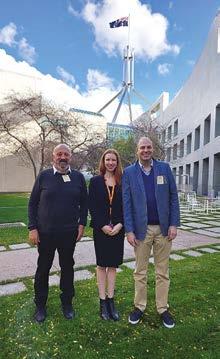
Key among their messages were the urgent need for action on recruitment and retention of child protection workers, and the need for a national workforce plan.
“While much of the responsibility for child protection is at the State Government level, the Federal Government also has an important role to play in contributing to a sustainable solution,” said PSA General Secretary Natasha Brown.
“The PSA has been raising issues surrounding under-resourcing, workload, recruitment and retention in the Department for Child Protection for years. It is important for members’ voices to be heard in the halls and offices of Parliament House in Canberra.”
The PSA will continue to advocate across all levels of government for appropriate resourcing and improved working conditions for our members in child protection.
UNION WINS
RECLASSIFICATION SUCCESS AT DCP AND WCHN
In May, the PSA was advised that its application for reclassification of Department for Child Protection (DCP) Case Workers from OPS3 to OPS4 had been successful.
The application was lodged on behalf of 16 members in roles including Case Workers, Youth Workers — Transition from Care, and Care and Protection Workers. They were all classified as OPS3 staff with no option to move to a higher classification without tertiary education.
However, in recent years Case Workers have been exposed to matters of increased complexity and taken on greater risk and responsibility in their roles. DCP has a risk framework with behaviours and issues rated from Category 1 to Category 4. Case Workers are only meant to have input in
Category 1 and 2 matters. In reality, they operate across all areas and have no ability to transfer a matter when it changes from Cat 1 to Cat 4 overnight.
Children in Cat 4 may also have significant intellectual disabilities, which Case Workers would not normally be exposed to if they were only operating at the OPS3 level.
The reclassification is an important win for Case Workers, which opens up a whole new bracket in the OPS stream and scope for better retention rates in these vital child protection roles.
The PSA would like to acknowledge the significant role our OPS 3 members played in achieving this outcome. It is testament to the fact that members in DCP have the power to make a real difference.
Meanwhile Health Support Officer (HSO) members at the Women’s and Children’s Health Network (WCHN) who were part of a PSA-led application have been successful in being reclassified from OPS1 to OPS2.
As part of their campaign for reclassification, HSOs argued that they do not work under close direction, were often working on-site alone, and the only access to support from a registered nurse was over the phone, meaning their roles had been mis-classified at the base level of OPS1.
The win will also see applicants receive backpay at the OPS2 level from 23 May 2022.
Public Sector Review Magazine | AUGUST 2023 10
CONSULTATION: AN INDUSTRIAL RIGHT ENSHRINED IN YOUR AGREEMENT

The PSA spends a considerable amount of time each week reminding agencies of their obligation to consult with their employees when they are proposing changes in the workplace.
Letters are sent to Chief Executives, managers and HR staff citing the relevant clauses in the South Australian Public Sector Enterprise Agreement: Salaried 2021. We also need to point out that the status quo must remain in the workplace until discussions with affected employees and a genuine workload assessment has taken place.
Consultation provisions have been enshrined in your enterprise agreements for many years, but some Government agencies still try to implement changes at whim or only seek to involve the PSA and our members after the fact.
Put simply, this is a serious breach of the enterprise agreement. The PSA relies on our Worksite Representatives, and other members on the ground, to alert us when management is not adhering to the agreement.
The clauses in the Salaried Agreement are clear, so there should be no grey areas about what needs to be consulted on with employees.
Similarly, consultation cannot be an ‘eleventh hour’, ‘tick-box’ exercise. Both employees and the PSA need sufficient time to fully assess the impacts of workplace changes.
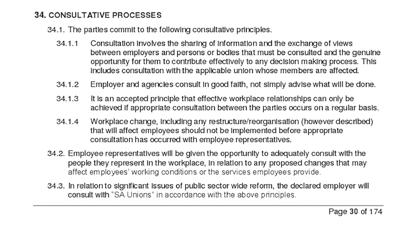
Consultation is a hard-won condition designed to make decision-making truly collaborative, allowing workers to have a say about how their workplaces operate.
The PSA regularly emails information updates to members asking for feedback about proposed workplace changes. This is an excellent opportunity to have your say while protecting your anonymity, as the PSA provides feedback to an agency in a collated and non-identifying manner.


It is incumbent on management to take your feedback seriously and give due consideration to it. Consultation means having a genuine opportunity to influence decisions that affect you at work.
If you believe that consultation is not taking place regarding changes in your workplace, contact the PSA Members’ Rights Hotline today on 8205 3227 or at enquiries@psaofsa.asn.au
www.psaofsa.asn.au 11
PSA BACKS ‘YES’ CAMPAIGN FOR VOICE
The Public Service Association (PSA) has formally announced its support for a ‘Yes’ vote for the referendum on an Aboriginal and Torres Strait Islander Voice to the Australian Parliament.
The PSA Council adopted this as PSA policy at its meeting in April.
The PSA is extremely mindful of the varying views about the proposed Voice among Aboriginal and Torres Strait Islander communities. In order to inform the PSA’s position – including whether we should take a position at all — we consulted with our Aboriginal and Torres Strait Islander membership over several months.
In taking this stand, the PSA joins many unions across Australia, which are embracing the ‘Unions for Yes’ campaign in seeking to make history and usher in this landmark constitutional change.

What a ‘Yes’ vote means
A ‘Yes’ vote in the upcoming referendum will do two things. It will, for the first time, formally acknowledge Aboriginal and Torres Strait Islander peoples as the first peoples of the land we know today as Australia.
Secondly, it will enable the establishment of a Voice to Parliament advisory group, which will have the authority to make representations to the Australian Parliament and Executive Government on matters relating to Aboriginal and Torres Strait Islander peoples. Both Aboriginal and Torres Strait Islander peoples and the Australian Parliament will jointly decide how the Voice will operate. Representations made by the Voice will be considered, but may or may not be adopted.
After more than 65,000 years of continuous culture, it is time Aboriginal and Torres Strait Islander people
were recognised in our 122-year-old Constitution.
Voting ‘Yes’ allows us as a nation to both symbolically and practically reconcile with our colonial past and take steps towards healing.
A ‘Yes’ vote is a not a fix-all. It will simply allow representatives of our Aboriginal and Torres Strait Islander communities to speak to power and authority in an authentic voice to ensure the social, cultural and economic concerns of those communities are on the nation’s agenda. This should be a positive step forward, however, there will be much more work to be done.
Too many Aboriginal and Torres Strait Islander people experience lower quality of life outcomes than other Australians.
Public Sector Review Magazine | AUGUST 2023
12
WE’RE VOTING YES!
Evolution of a Voice
The concept of an Aboriginal and Torres Strait Islander Voice to the Australian Parliament has its roots in the long-standing struggle for recognition, representation, and self-determination of Australia’s First Nations peoples.
A pivotal moment in the evolution of the Voice came in 2017 with the release of the Uluru Statement from the Heart. This statement emerged from a series of Aboriginal and Torres Strait Islander-led dialogues known as the First Nations National Constitutional Convention. It called for the establishment of a “First Nations Voice” enshrined in the Constitution and the creation of a Makarrata Commission to oversee a process of truth-telling and reconciliation.
The Uluru Statement from the Heart resonated with many
Australians and sparked a nationwide conversation about constitutional reform and representation of Aboriginal and Torres Strait Islander peoples.
While the Australian government of the time initially rejected the proposal for constitutional change, it committed to exploring other avenues for ensuring an Aboriginal and Torres Strait Islander Voice.
In 2019, a Joint Select Committee on Constitutional Recognition Relating to Aboriginal and Torres Strait Islander Peoples was established to further examine the issue. This committee recommended the establishment of a constitutionally enshrined Aboriginal and Torres Strait Islander Voice to Parliament, which would provide advice and input on matters affecting this group of Australians.
Even when they have had good intentions, governments, and parliaments by themselves have not provided lasting solutions. A Voice to Parliament will ensure that Aboriginal and Torres Strait Islander people can advise politicians about what works in their communities. It is about making sure policies and laws deliver real results on the ground and better value for taxpayer money.
The Voice to Parliament will be a group of Aboriginal and Torres Strait Islander people who represent communities and provide advice to Parliament.
Experience shows that when grassroots Aboriginal and Torres Strait Islander people can give advice to politicians, better decisions are made.
The Constitution cannot be changed by politicians, it can only be changed by the Australian people — the owners of the
Constitution. This is an opportunity for us to work together towards change. Even though a number of politicians have already said they oppose the proposal, ultimately, it is the Australian people who will decide the outcome of the referendum.
All of Australia benefits when we recognise and respect Aboriginal and Torres Strait Islander peoples’ knowledge, cultures and stories.
This is an opportunity for all Australians to come together and contribute to building a stronger, fairer nation.
It’s time we open our nation’s next chapter by voting ‘Yes’ at the referendum.
WhatAustralians are being asked to vote on
The question to be put to the Australian people at the 2023 referendum will be:
“A Proposed Law: to alter the Constitution to recognise the First Peoples of Australia by establishing an Aboriginal and Torres Strait Islander Voice.
Do you approve this proposed alteration?”
Find out more at https://www.niaa.gov.au/indigenousaffairs/referendum-aboriginal-and-torresstrait-islander-voice
www.psaofsa.asn.au
Authorised by Dean Parkin, Australians for Indigenous Constitutional Recognition Ltd, L 35, Tower Two, 200 Barangaroo Avenue, Barangaroo, NSW
13
BRIDGING THE GENDER PAY GAP

Reducing pay inequality has long been a union fight and the PSA is active in seeking to bridge the gap between men’s and women’s incomes to achieve greater financial equity over the course of their respective working lives.
PSA General Secretary and SA Unions Women’s Vice President Natasha Brown sits on the South Australian Gender Pay Gap Taskforce, which was established by the Government last year to provide high-level advice to the Minister for Women and the Prevention of Domestic and Family Violence, Katrine Hildyard.
The Taskforce is charged with identifying the factors and issues that create the gender pay gap in South Australia, across public, private and not-for-profit workplaces. It has a two-year term and will make recommendations on steps that can be taken to eliminate the gap between the average earnings of men and women.
“We need to address a range of social and economic factors that contribute to the gender pay gap, because it affects women across all industries and occupations,” Natasha Brown said.
“We must continue agitating for gender equity to ensure that all women can live and work with dignity and respect.
MOVES WITHIN AUSTRALIAN PUBLIC SERVICE
Expanding parenting leave provisions is gaining currency in other industrial jurisdictions, with the Australian Public Service Commission recently releasing a review of the Maternity Leave (Commonwealth Employees) Act 1973, which recommends substantial improvements to accommodate the needs of modern-day parents.
Among its recommendations are the following changes to leave entitlements:
“Unions play an essential role in keeping this issue on the agenda and demanding social and economic equity for all women.”
To that end, the PSA has been lobbying government for some time about the need to extend superannuation payments to periods of unpaid parental leave and also to pay superannuation contributions to parents who return to work on a part-time basis at a level equivalent to what would be paid on their substantive full-time salary.
These formed part of the PSA’s claims in the most recent salaried enterprise bargaining negotiations.
“Paying superannuation on any unpaid component of maternity leave would go some way to reducing the disadvantage women face in retirement when they traditionally have lower superannuation balances than men, due to time off for having children and caring for those children,” Natasha Brown said.
“In addition to the superannuation disadvantage, prolonged absences from the workplace, or reduced hours due to parenting responsibilities, can also make career progression more difficult — in turn creating a financial impact.”
She said it was important that this type of provision be accessible to both birthing and non-birthing parents, and include adopting and same sex parents.
• 18 weeks of paid leave available to both parents independently, with 24 months of parental leave available in total (the remainder is unpaid)
• Flexible use of parental leave, broken up into single days or part-time work as desired as well as taken at half-pay for twice as long
• Provision of pregnancy leave for the six weeks leading up to the estimated birth date
• Inclusion of adoption under parental leave
• Extension of stillbirth entitlements to the other partner
• Provision of both paid pregnancy loss leave and paid premature birth leave
• Superannuation to be paid during all forms of parental leave
• Leave to be accrued during unpaid parental leave
• Paid lactation breaks.
The foreword to the review report states the following:
“Submissions overwhelmingly advocated for changes to the Act to ensure that the Commonwealth as an employer remains competitive, attracts the best people and joins employers in other jurisdictions and the private sector in providing entitlements for all new parents.”
The PSA will watch with interest any developments on this front in the Commonwealth public sector and will continue to push for change at the State level.
14
Public Sector Review Magazine | AUGUST 2023
DOIN’ IT FOR THEMSELVES
In May, the PSA hosted a group of committed South Australian unionists from various industries for the annual Anna Stewart Memorial Project (ASMP), organised by SA Unions.
The training program, which has been running in South Australia since 1985, provides insight into how unions work and identifies ways of increasing the involvement of women and people of marginalised genders in the union movement. This initiative builds skills and establishes networks of support, paving the way to create pathways for participants to become passionate and effective leaders in the union movement.
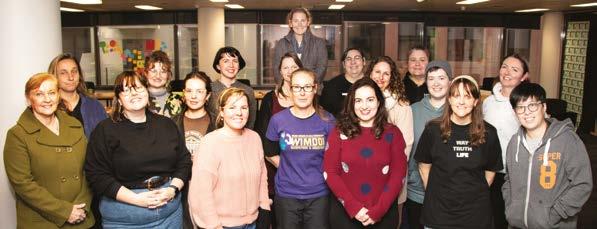
The ASMP honours the life and contribution of trade unionist Anna Stewart, who was a prominent campaigner and women’s rights activist in Victoria in the 1970s and early 1980s.
The PSA invited cis-gender women, trans women, non-binary, intersex, or genderdiverse members to apply for the program.
This year, the PSA supported members, Rebecca Evans, from the Art Gallery of SA
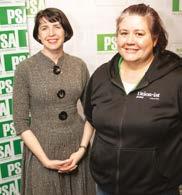
Rebecca is Curator of Decorative Arts and Design at AGSA, and while she has been a PSA member for many years, she has become much more active in the union over the past 18 months as a Worksite Representative.
Rebecca saw involvement in the ASMP as way of gaining important transferable professional development skills, and as an opportunity to look at the issues of women and working life without the shackles of traditional thinking.
“It’s like permission to imagine a world that doesn’t exist yet,” she said.
“It’s really easy to go with what is already there ... but imagining something else is really hard work.
“There is a misalignment of the needs of women with the way society in Australia is structured ... rather than keeping bandaiding the whole process there needs to be substantial structural change.”
She cites as one of those structural changes the need for reforms to superannuation on unpaid maternity leave to reduce the financial gap between men and women at retirement. She also believes there needs to be more flexibility
in the workplace for women, particularly those with caring responsibilities.
Kim Nester is a Social Worker with the Gawler Mental Health Team and has been a PSA Worksite Representative for more than 10 years, first while working in community mental health at Port Augusta before taking on her current role.
She said she was keen to learn new information and skills from the ASMP to equip her to build membership within her team, which included many new graduates as well as other workers who had been reluctant to join the union.
“We need to protect the rights that we’re entitled to and those of us on the floor need to band together for more collective power,” she said.
Kim also said it was important to carry on the legacy of the many strong women who had an impact on the labour movement throughout history.
“A lot of women fought, suffered and died ... we need to continue that fight and we need to keep our union strong with female representation so our suffragettes can be honoured. If we haven’t got active female membership, we’re going to lose everything we’ve fought for and that can’t happen,” she said.
The second part of the ASMP program will be held in September.
www.psaofsa.asn.au 15
(AGSA) and Kim Nester, from the Gawler Adult Mental Health team (Barossa Hills Fleurieu Local Health Network) to take part in the ASMP training.
Above: Participants in the 2023 Anna Stewart Memorial Project held at the PSA office in May.
PSA members Rebecca Evans (left) and Kim Nester
OUT AND ABOUT
WITH PSA MEMBERS
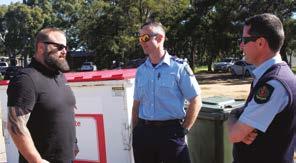
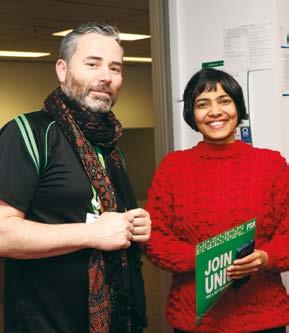
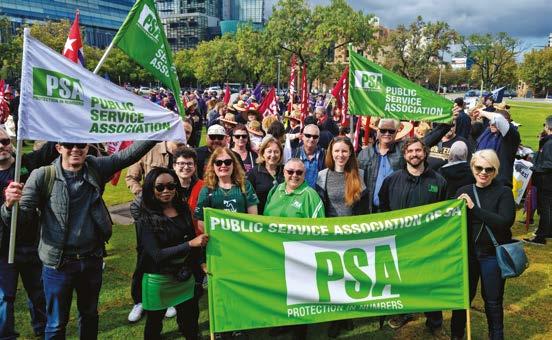
Public Sector Review Magazine | AUGUST 2023 16

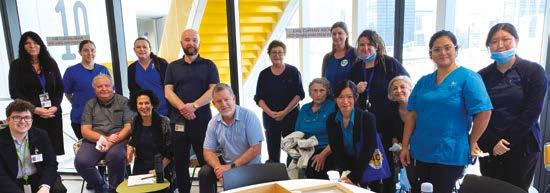
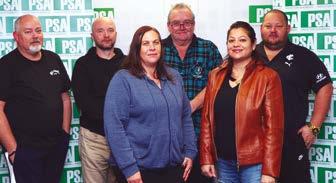
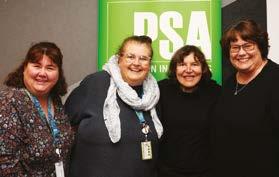
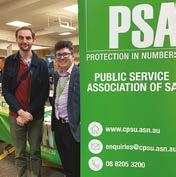


www.psaofsa.asn.au 17
GLOBAL JUSTICE EDUCATION FOR UNIONISTS
Union Aid Abroad-APHEDA is the global justice organisation of the Australian trade union movement. The organisation works to support stronger union and social movements in 13 locations in Southeast Asia, the Pacific, the Middle East, and Southern Africa. APHEDA’s approach to development and movementbuilding work is centred in values of partnership, solidarity, equality, justice, and accountability.
APHEDA provides on-the-ground assistance which aims to address the causes of injustice and inequality, not the symptoms. APHEDA supports organised movements of people to make their own change possible, by exerting political pressure for just and sustainable solutions.
One of the ways of standing with marginalised people of the Global South is by building knowledge among Australian unionists about past and current movements for global justice. Building internationalism is crucial, and APHEDA seeks opportunities to pass on these lessons to union leaders of the future.
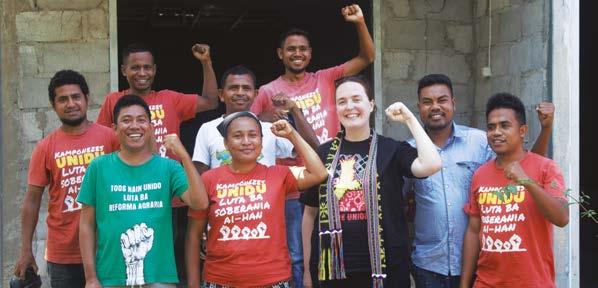
New training module launched
Recently, APHEDA has been working with a group of volunteer union educators to create a new training module on global justice and international solidarity.
The training will give participants a better understanding of the key political, economic and social issues affecting workers and communities in Australia and overseas. It encourages participants to think about ways in which international solidarity is important to their union. Along the way, it explores APHEDA’s history and delves into the frontline work of APHEDA’s partner organisations in the areas of climate justice, trade union development, women’s rights and refugee rights.
This training module, which has a 30-minute and a 90-minute version, is designed to be a resource available for all unions and like-minded civil society organisations. It is a contribution to continuing the tradition of building an internationally concerned and engaged union movement in Australia.
In March, a pilot of this training was delivered as part of Victorian Trades Hall Women’s Rights At Work Fest. It had a specific focus on feminist movement building, but the training can also be adapted to focus on climate justice and other specific themes.
HELP US CONTINUE GLOBAL JUSTICE EDUCATION
Union Aid Abroad-APHEDA is looking for volunteers to expand this program across the country. If you have a background in training delivery and would like to be part of the group delivering our training, or if you know a group who would like to receive this training, please get in touch with APHEDA’s Lead Organiser Lachlan Batchelor by email at lbatchelor@apheda.org.au.
Public Sector Review Magazine | AUGUST 2023 18
Participants will strengthen their understanding of the issues facing workers around the world, such as farmers in Timor Leste who are unionising for the first time.
FINANCIAL INDEPENDENCE TO FINANCIAL WELLNESS
Financial wellness a measure of how well a person manages their financial life. Improving financial wellness is about practicing better money habits, setting goals, and taking steps to achieve them –all with the intention of improving your quality of life and reducing stress.

We know that many Australians are keen to achieve their own version of financial independence and financial wellness, whatever that might look like.
We know that many Australians are keen to achieve their own version of financial independence and financial wellness, whatever that might look like.
Financial wellness impacts many of your day-to-day activities, but it also covers big long-term projects like retirement and doing the things that are important to you such as, travel, hobbies, holidays and time with friends and family.
Financial wellness impacts many of your day-to-day activities, but it also covers big long-term projects like retirement and doing the things that are important to you such as, travel, hobbies, holidays and time with friends and family.
There are a lot of things to consider when you start planning for financial independence in retirement and some questions you need to ask yourself, such as:
There are a lot of things to consider when you start planning for financial independence in retirement and some questions you need to ask yourself, such as:
1. What are the things you want to do be able to do?
1. What are the things you want to do be able to do?










2. What will they cost?
2. What will they cost?

3. What will it cost you to live comfortably (if you don’t have a budget today, it makes it difficult to estimate what your future expenses could be)?
3. What will it cost you to live comfortably (if you don’t have a budget today, it makes it difficult to estimate what your future expenses could be)?
4. Do you want to fund part of your retirement income via the Age Pension? How much of your living costs would this cover?
4. Do you want to fund part of your retirement income via the Age Pension? How much of your living costs would this cover?
5. Do you want to leave money to your children, grandchildren, or charities? Or do you want to use it all?
5. Do you want to leave money to your children, grandchildren, or charities? Or do you want to use it all?
There’s no right answer, but your choices all affect the amount of money you’ll need to save.
There’s no right answer, but your choices all affect the amount of money you’ll need to save.




To take the first step towards financial independence, you can use our Super Projection Calculator to show you what your current retirement projection looks like – you’ll be able to see the impact of making extra contributions or changing your investment mix.
To take the first step towards financial independence, you can use our Super Projection Calculator to show you what your current retirement projection looks like – you’ll be able to see the impact of making extra contributions or changing your investment mix.
Super SA provides a range of products that can assist you in your retirement needs. If you’re ready to take your first steps to achieving financial wellness, you are encouraged to seek financial advice. You can choose your own financial planner or take advantage of the service available through Industry Fund Services, who can advise you on the options available to SA Public sector employees2
Super SA provides a range of products that can assist you in your retirement needs. If you’re ready to take your first steps to achieving financial wellness, you are encouraged to seek financial advice. You can choose your own financial planner or take advantage of the service available through Industry Fund Services, who can advise you on the options available to SA Public sector employees2
There are a lot of variables to consider, working patterns, life expectancy, additional contributions, and goals. This has impacts on your balance over your financial journey.
There are a lot of variables to consider, working patterns, life expectancy, additional contributions, and goals. This has impacts on your balance over your financial journey.
If you’re nearing retirement and looking for help, we recommend seeing a financial planner.
If you’re nearing retirement and looking for help, we recommend seeing a financial planner.




Independent research conducted by CoreData1, revealed 91 per cent of advised clients believed their planner helped them to achieve their financial goals. What’s more, 90 per cent of advised clients said that accessing financial advice has left them in a better position financially. So, if you’re already receiving advice, that’s good news!
Independent research conducted by CoreData1, revealed 91 per cent of advised clients believed their planner helped them to achieve their financial goals. What’s more, 90 per cent of advised clients said that accessing financial advice has left them in a better position financially. So, if you’re already receiving advice, that’s good news!
To find out more, call the Super SA Advice Administration team on 1300 162 348
To find out more, call the Super SA Advice Administration team on 1300 162 348
For questions about your super, contact Member Services on 1300 369 315
For questions about your super, contact Member Services on 1300 369 315

and services or products provided or recommended by IFS.






2 For this to be a mere referral, consideration might be given to whether Super SA is receiving any financial benefit from IFS under the contract, and if so, whether that should be disclosed.



www.psaofsa.asn.au 19 Super SA has engaged Industry Fund Services Limited (IFS) (ABN 54 007 016 195 AFSL No 232514) to facilitate the provision of financial advice to members of the super schemes administered by Super SA. Advice is provided by financial planners who are Authorised Representatives of IFS. Further information about the advice services that can be provided is set out in the relevant IFS Financial Services Guide, request a copy by calling 1300 162 348. IFS is responsible for any advice given to you by its Authorised Representatives. Super SA does not recommend, endorse or accept responsibility for products or services or products provided or recommended by third-party organisations, including IFS. Super SA does not accept liability for any loss or damage caused by the products and services or products provided or recommended by IFS. 1 Benefits of financial advice extends beyond financial gains - IOOF SSA1653 2 For this to be a mere referral, consideration might be given to whether Super SA is receiving any financial benefit from IFS under the contract, and if so, whether that should be disclosed.
supersa.sa.gov.au
Super
1300
Financial wellness is a measure of how well a person manages their financial life. Improving financial wellness is about practicing better money habits, setting goals, and taking steps to achieve them –all with the intention of improving your quality of life and reducing stress.
SA has engaged Industry Fund Services Limited (IFS) (ABN 54 007 016 195 AFSL No 232514) to facilitate the provision of financial advice to members of the super schemes administered by Super SA. Advice is provided by financial planners who are Authorised Representatives of IFS. Further information about the advice services that can be provided is set out in the relevant IFS Financial Services Guide, request a copy by calling
162 348. IFS is responsible for any advice given to you by its Authorised Representatives. Super SA does not recommend, endorse or accept responsibility for products or services or products provided or recommended by third-party organisations, including IFS. Super SA does not accept liability for any loss or damage caused by the products
1 Benefits of financial advice extends beyond financial gains - IOOF SSA1653
supersa.sa.gov.au
SALMON AND SWEET POTATO FISHCAKES WITH GREEN BEANS
Add this nutritious meal from Sprout Health Studio to your mid-week dinner menu.
Serves: 4 Prep Time: 15 minutes Cook Time: 15 minutes
Ingredients
2 spring onions, thinly sliced
1 green chilli, roughly chopped
Thumb-sized piece of ginger, roughly chopped
½ bunch of coriander, leaves picked and stems
roughly chopped
350g sweet potato, peeled and steamed until very tender
2x 180g salmon fillets, skin off
1 egg, lightly beaten
½ cup breadcrumbs
1 lemon, zested then juiced
Pinch of salt
1 tablespoon olive oil
400g green beans, trimmed
¼ cup tahini
1 garlic clove, finely grated
¼ cup pitted green olives, halved
2 tablespoons roasted almonds, roughly chopped
Method
Place spring onion, green chilli, ginger, coriander stems and half the leaves in small food processor. Blitz until a rough paste forms. Cut salmon and sweet potato into smaller pieces, add to processor and blitz again until smooth. Transfer mixture to a large bowl and stir through egg, breadcrumbs, lemon zest and a good pinch of salt. Divide mixture into four even portions and flatten into patties.
Heat oil in a large frying pan over medium heat. Cook patties for 4-5 minutes each side or until golden brown and cooked through. Remove from pan and keep warm. Return frying pan to medium-high heat. Cook green beans for 3-4 minutes or until lightly charred and tender.
Meanwhile, whisk together tahini, garlic, lemon juice and three tablespoons iced water in a small bowl. Season with a pinch of salt.
Divide tahini sauce between serving plates and arrange fishcakes to one side. Place green beans on the other side and garnish with green olives, almonds and remaining half the coriander leaves.

Nutrition Tip: As well as being a source of protein, salmon is a good source of omega3s. These fatty acids are considered essential in our diet, as they can’t be made by our body.
For more information about Health Partners for PSA members visit https://www.healthpartners.com.au/psamembers
Public Sector Review Magazine | AUGUST 2023 20 PSA members
with
Partners. We’re a fund that’s
not-forprofit, so you get
the
stuff. Get an ongoing 6% discount on your health cover. Call 1300 113 113 today and quote PSA or get a quote online Refer website for terms and conditions.
pay less for great value health cover
Health
100%
more of
good
SOMEBODY THAT I USED TO KNOW …
Navigating the legal landscape of relationship breakdown
When a marriage or relationship breaks down, it can be a distressing, unsettling, and profoundly life-altering experience. Some people separate on amicable terms but for others it is much more difficult. When the end of a relationship is being contemplated or has happened, there are certain preliminary steps it can be sensible to take.
Accessing help and support from health care professionals such as GPs, counsellors, and psychologists early on can be enormously helpful. The same can be said about getting legal advice. A family lawyer will be able to provide personalised advice, offer clarity, and help with understanding rights and obligations under the law.
Also, starting a personal diary as soon as possible after separation can be a good way of documenting important dates, events, interactions and agreements. Separations are often stressful and it is normal to feel overwhelmed. A diary and detailed notes help by alleviating the burden of having to rely on memory alone.
Cyber security
Prior to or at the time of separating, it is important to do an audit of devices, digital services and subscriptions along with the passwords and PINs that go with them. It is good practice to change all passwords and PINs to prevent unauthorised access.
Take special care to secure devices (including personal computers, phones, tablets), email addresses, online banking, and social media.
For peace of mind, check the location services and tracking functions on devices and those linked to digital services and subscriptions. Remove any location or tracking permissions given previously to a former partner unless there is a mutual agreement to keep them.
Personal documents
Resolving a property settlement involves gathering and exchanging essential documents including tax returns, bank statements, and superannuation details. Arriving at a fair settlement can be difficult if the extent of assets is unknown. Gathering as much financial information as possible can help to establish the asset pool early to allow for a prompt, sensible and fair settlement.
Sorting out a settlement
The standard approach to settlement involves establishing a net asset pool. Then, contributions and future needs factors (e.g. age, health, income, and care of children) are identified, evaluated, and weighted. In some situations, other adjustments are made to ensure a just and equitable outcome.
Formalising terms of settlement can often provide Stamp Duty exemptions and Capital Gains Tax rollover relief and it is important to seek legal and financial advice about those issues. If agreement can’t be reached, an experienced family lawyer can assist with navigating court processes and procedures.
Interim arrangements
While the big question of how to divide the net asset pool is being determined, it can be important to make arrangements that will operate in the interim for things like who is going to stay in the house, whether joint accounts are
to be closed or remain open (and under what conditions), and what is to happen with any mortgage (and associated redraw facilities and/or offset accounts). A family lawyer can examine how assets are held and offer advice about how best to secure them.
Estate planning
Some aspects of separation can also affect estate planning. Review and update documents such as Wills, Powers of Attorney and Advance Care Directives. Insurance beneficiary provisions and superannuation nominations should be reviewed as well.
Time limits for settlement
There are time limits for property settlements. De facto couples have two years from the date of separation while married couples have 12 months from date of the final Divorce Order. Most of the time, married couples should focus on settling property matters before getting divorced. An experienced family lawyer can give tailored information and advice about any relevant time limits.
Pathways to resolution
There are lots of helpful support services and resources available to people contemplating or experiencing separation. Family Relationships Online has many useful resources, including a tool for locating nearby Family Dispute Resolution and communitybased mediation services. Visit https://www. familyrelationships.gov.au/separation/familymediation-dispute-resolution for details.
In addition, 1800respect.org.au and mensline. org.au offer counselling and support for individuals facing relationship breakdowns, family violence, and mental health concerns.

If you would like advice or direction from a lawyer about your situation, please contact Johnston Withers Senior Lawyer Morgan O’Brien-Powell on (08) 8231 1110.
Disclaimer: This information is general in nature and has not been tailored to account for personal circumstances. For example, if there is a risk of family violence or abuse, these steps may not be suitable.

www.psaofsa.asn.au 21
image: Freepik.com
PSA HOLIDAY HOME: PORT VINCENT

Port Vincent is charming seaside town on the Yorke Peninsula offering pristine beaches, clear blue waters, and breathtaking scenery.
It’s the perfect destination for those seeking a relaxed and peaceful getaway. The town boasts a rich history, with a number of historic buildings and cultural landmarks that offer a glimpse into its past.
Visitors can take a stroll along the boardwalk, enjoy a picnic at the local park, or sample some of the town’s famous seafood at one of its eateries. With a range of outdoor activities on offer, including fishing, boating, and surfing, Port Vincent is a haven for water sports enthusiasts.
Whether you’re looking for a relaxing beach holiday, a weekend getaway, or an exciting adventure, Port Vincent is the perfect place to escape from the hustle and bustle of city life. Book your stay today and discover the natural beauty and rich culture of this stunning South Australian town.
The PSA has two holiday home units at Port Vincent, each with two bedrooms (sleeping up to six people). Pillows and blankets are supplied, with guests to provide their own sheets and pillow cases. There are laundry facilities, barbecue and a single lock up garage, and Unit 1 is pet friendly. (Contact our Member Benefits team for further details.)
PSA Holiday Homes are the best value accommodation available and they are offered exclusively to PSA members. Check out what’s available at psaofsa.asn.au/psa-holiday-homes, email holidayhomes@psaofsa.asn.au or call our Member Benefits Team on 8205 3200 today to secure your booking.
PSA DISCOUNTED GIFT CARDS
Don’t forget, as a PSA member, you are entitled to year-round discounts of 5% off Coles, Foodland, and Drakes gift cards, 4% off Woolworths gift cards, and 10% off Harris Scarfe gift cards.
By taking advantage of these member benefits, you can make substantial financial savings.
Visit the Member Benefits Centre at 122 Pirie Street today or use the order form online at the PSA website.

Public Sector Review Magazine | AUGUST 2023 22
PSA JOINS UNION SHOPPER
This year, the PSA has joined forces with Union Shopper to provide members with a great new package of deals and discounts to help drive your dollars further.
Totally union owned and run, Union Shopper offers many benefits including discounts on electrical items, new cars, discounted gift cards, movie tickets, wine, travel, entertainment, finance and much more. Not to mention hundreds of offers available for entertainment and leisure activities.
By making one relatively large purchase or a few smaller purchases through Union Shopper you could easily receive
savings in excess of your annual union fees.
The Electrical Purchasing Service is one of the most popular moneysaving services, providing you with commercial pricing at both The Good Guys and JB Hi-Fi. Register on the Union Shopper website and create an account to check out the pricing.
If you’re looking to secure your next new car at the best possible price, remove the stress of negotiating with car dealers and let the Motor Market team do the work for you, from your initial enquiry through to delivery, including all optional extras.
From insurance to theme park tickets, groceries to wine, and car servicing to holiday costs, Union Shopper has a huge range of discounted products and services for you to enjoy.
Find out more at the PSA website psaofsa.asn.au
WHAT’S ON YOUR PSA UNION NOTICEBOARD?
Your PSA Union Noticeboard is one of the best ways to share information with members, and those yet to join the PSA, about the issues in your workplace and the industrial wins we’ve been able to achieve together.
Some tips for keeping your noticeboard up to date:
• Post the latest PSA Information Updates and Meeting Notices.
• Promote upcoming Lunch ‘n’ Learn events such as Super SA and Legal Services sessions, reclassification courses and Know Your Rights presentations.
• Highlight industrial wins in your workplace and other public sector workplaces.
• Post articles of interest from the Public Sector Review magazine.
• Promote member benefit discounts (e.g. discounted gift cards).
• Display the Fighting the Good Fight poster from the back of this Review.
If you need a PSA Union Noticeboard banner for your workplace, contact us at enquiries@psaofsa.asn.au.

www.psaofsa.asn.au
23
Bringing you member benefits backed by the collective bargaining power of the union movement
FIGHTING THE GOOD FIGHT
Public Service Association of SA
Representing public sector workers and championing public services since 1885.
psaofsa.asn.au

JOIN NOW



 by Lillia Rozaklis
by Lillia Rozaklis














































